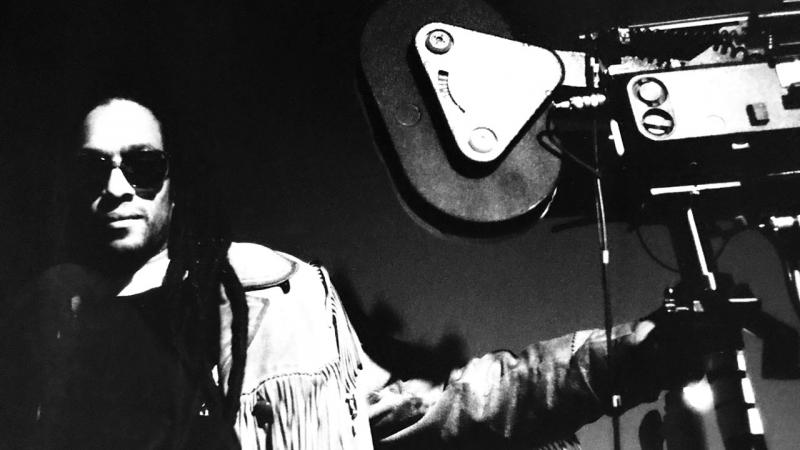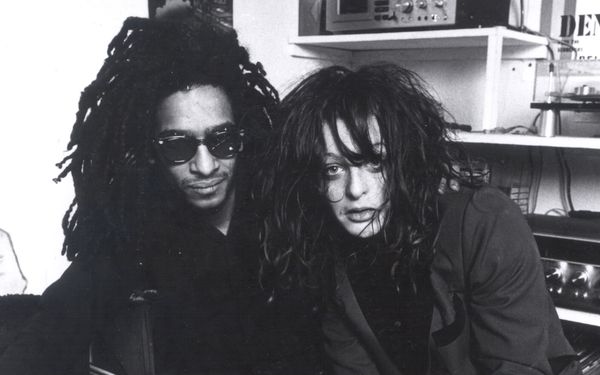Rebel Dread review - generous documentary portrait of punk-reggae legend Don Letts | reviews, news & interviews
Rebel Dread review - generous documentary portrait of punk-reggae legend Don Letts
Rebel Dread review - generous documentary portrait of punk-reggae legend Don Letts
Familiar talking heads and archive footage deployed to cover an intriguing career in music

Don Letts, the film director, musician and DJ responsible for so many of the iconic images of punk and reggae artists, executive produced this documentary portrait.
Born in Brixton to parents who had come over from Jamaica in the mid ‘50s to work on the buses and the garment trade, Letts recalls growing up unaware of racism until Enoch Powell’s infamous ‘rivers of blood’ speech in ’68. But rather than dwell on persecution, Letts focuses on the simultaneous American civil rights movement – cue James Brown performing ‘Say It Loud, I’m Black and I’m Proud’. It’s fascinating too to learn that his first gig was going to see The Who and that he was a huge fan of the Beatles. Style was always crucial and led to Letts being something of a ladies' man with a complicated family life.
Teenage Don Letts sported aviator shades and an Afro. His older brother Desmond Coy remembers a David Bowie phase when he wore earrings and eye shadow too. Working in a clothes shop on the King’s Road led Letts to fall under the influence of Malcolm McLaren and Vivienne Westwood. Invited to DJ at the Roxy in Covent Garden resulted in Letts fusing London’s burgeoning punk scene with what he describes as his Rasta brethren. After the club closed, musicians including the Sex Pistols, the Clash and Billy Idol would head back to Letts’ place in Forest Hill to carry on partying. Buying a Super-8 camera to shoot punk concerts set him on the path to becoming a prolific director with over 400 music videos to his name as well as full-length documentaries.
 A stint managing the all-girl punk band The Slits (Letts above with the late Ari Up), led to touring with The Clash on the White Riot tour. A long film collaboration with the band survived their split in 1986 and saw Letts join Mick Jones's Big Audio Dynamite as a musician. He makes no pretence of being a great vocalist or instrumentalist but definitely deserves credit for BAD’s innovative use of sampling and its fusion of musical genres.
A stint managing the all-girl punk band The Slits (Letts above with the late Ari Up), led to touring with The Clash on the White Riot tour. A long film collaboration with the band survived their split in 1986 and saw Letts join Mick Jones's Big Audio Dynamite as a musician. He makes no pretence of being a great vocalist or instrumentalist but definitely deserves credit for BAD’s innovative use of sampling and its fusion of musical genres.
There’s a lot of pleasure in hearing from veterans of the punk and Black British music scene, and also wallowing in Letts’ fabulous archive. Given that director William E Badgley has already made a documentary about The Slits (Here to be Heard), it’s a shame there isn’t more from the former band members, but maybe old disputes lie behind the on-screen absences. Music journalist Chris Salewicz is insightful throughout although it's disappointing that there’s only a tantalisingly brief glimpse of Vivien Goldman, the journalist turned musician and later academic authority on punk history. Rebel Dread is at its most interesting when Letts looks back on his first time staying in Jamaica in ’78. The reality of poverty in the townships clashed with the image he’d had from romanticised gangster films, particularly The Harder They Come. Letts recalls all the Jamaican bands whose records he’d treasured back in London turning up at their luxury hotel in the hope of getting a deal out of Richard Branson, observing wryly that the real pioneers in music never collect.
Letts regrets not being able to connect with his Jamaican grandparents and a later stint filming in Namibia made him feel even more alien. But he doesn’t dwell too much on the dilemmas of straddling cultures, taking pride in having made the first black music video (Musical Youth’s 'Pass the Duchy') to get played on MTV. The end of Rebel Dread plays a little too much like an obituary tribute to a man who is still very much alive, but this is an otherwise entertaining 80-minute gallop through an extraordinary life.
rating
Share this article
The future of Arts Journalism
You can stop theartsdesk.com closing!
We urgently need financing to survive. Our fundraising drive has thus far raised £49,000 but we need to reach £100,000 or we will be forced to close. Please contribute here: https://gofund.me/c3f6033d
And if you can forward this information to anyone who might assist, we’d be grateful.

Subscribe to theartsdesk.com
Thank you for continuing to read our work on theartsdesk.com. For unlimited access to every article in its entirety, including our archive of more than 15,000 pieces, we're asking for £5 per month or £40 per year. We feel it's a very good deal, and hope you do too.
To take a subscription now simply click here.
And if you're looking for that extra gift for a friend or family member, why not treat them to a theartsdesk.com gift subscription?
more Film
 London Film Festival 2025 - a Korean masterclass in black comedy and a Camus classic effectively realised
New films from Park Chan-wook, Gianfranco Rosi, François Ozon, Ildikó Enyedi and more
London Film Festival 2025 - a Korean masterclass in black comedy and a Camus classic effectively realised
New films from Park Chan-wook, Gianfranco Rosi, François Ozon, Ildikó Enyedi and more
 After the Hunt review - muddled #MeToo provocation
Julia Roberts excels despite misfiring drama
After the Hunt review - muddled #MeToo provocation
Julia Roberts excels despite misfiring drama
 Ballad of a Small Player review - Colin Farrell's all in as a gambler down on his luck
Conclave director Edward Berger swaps the Vatican for Asia's sin city
Ballad of a Small Player review - Colin Farrell's all in as a gambler down on his luck
Conclave director Edward Berger swaps the Vatican for Asia's sin city
 London Film Festival 2025 - Bradley Cooper channels John Bishop, the Boss goes to Nebraska, and a French pandemic
... not to mention Kristen Stewart's directing debut and a punchy prison drama
London Film Festival 2025 - Bradley Cooper channels John Bishop, the Boss goes to Nebraska, and a French pandemic
... not to mention Kristen Stewart's directing debut and a punchy prison drama
 London Film Festival 2025 - from paranoia in Brazil and Iran, to light relief in New York and Tuscany
'Jay Kelly' disappoints, 'It Was Just an Accident' doesn't
London Film Festival 2025 - from paranoia in Brazil and Iran, to light relief in New York and Tuscany
'Jay Kelly' disappoints, 'It Was Just an Accident' doesn't
 Iron Ladies review - working-class heroines of the Miners' Strike
Documentary salutes the staunch women who fought Thatcher's pit closures
Iron Ladies review - working-class heroines of the Miners' Strike
Documentary salutes the staunch women who fought Thatcher's pit closures
 Blu-ray: The Man in the White Suit
Ealing Studios' prescient black comedy, as sharp as ever
Blu-ray: The Man in the White Suit
Ealing Studios' prescient black comedy, as sharp as ever
 The Woman in Cabin 10 review - Scandi noir meets Agatha Christie on a superyacht
Reason goes overboard on a seagoing mystery thriller
The Woman in Cabin 10 review - Scandi noir meets Agatha Christie on a superyacht
Reason goes overboard on a seagoing mystery thriller
 London Film Festival 2025 - crime, punishment, pop stars and shrinks
Daniel Craig investigates, Jodie Foster speaks French and Colin Farrell has a gambling habit
London Film Festival 2025 - crime, punishment, pop stars and shrinks
Daniel Craig investigates, Jodie Foster speaks French and Colin Farrell has a gambling habit
 I Swear review - taking stock of Tourette's
A sharp and moving tale of cuss-words and tics
I Swear review - taking stock of Tourette's
A sharp and moving tale of cuss-words and tics
 A House of Dynamite review - the final countdown
Kathryn Bigelow's cautionary tale sets the nuclear clock ticking again
A House of Dynamite review - the final countdown
Kathryn Bigelow's cautionary tale sets the nuclear clock ticking again

Add comment